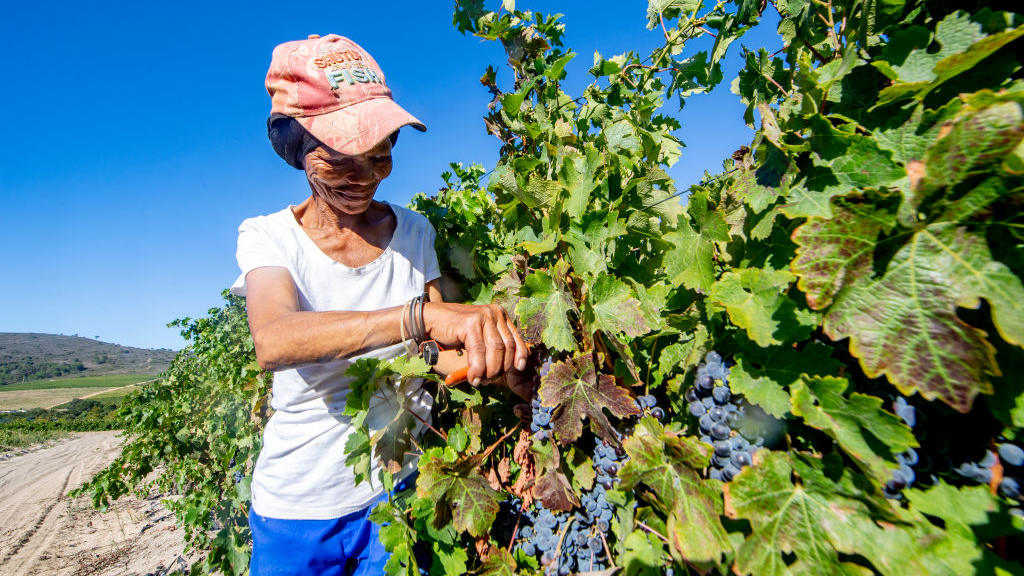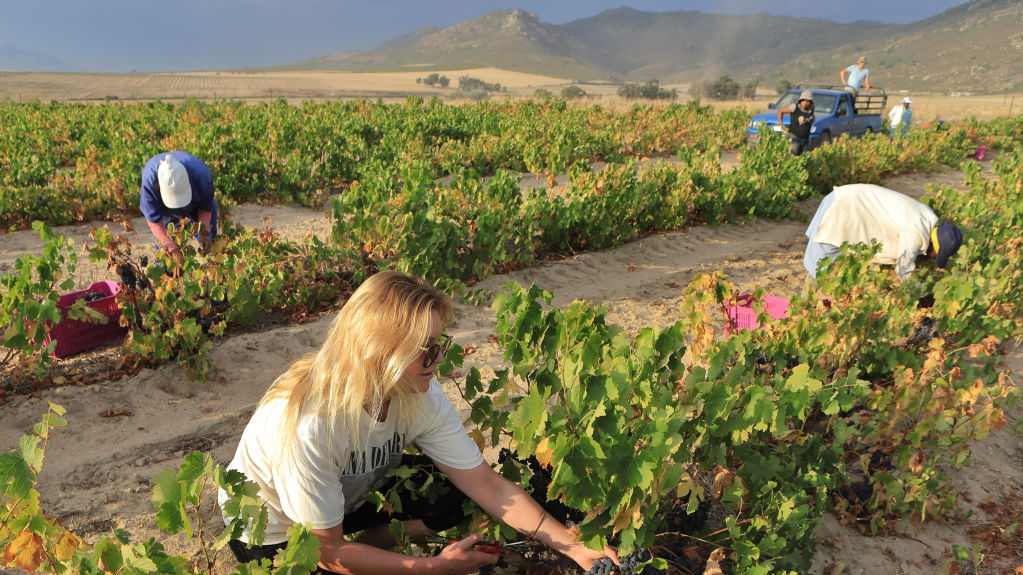
Kaapzicht Wine Estate in Cape Town, South Africa, February 9, 2021. /Getty
Kaapzicht Wine Estate in Cape Town, South Africa, February 9, 2021. /Getty
Editor's note: Wambui Gichuri is the African Development Bank's Acting vice president for Agriculture, Human and Social Development. She also serves as director for Water Development and Sanitation at the Bank. This article is to support women working to survive COVID-19-related economic downturns. The article reflects the author's opinions and not necessarily the views of CGTN.
The African continent hasn't experienced the devastating numbers of coronavirus deaths seen in other regions of the world, although sadly, case numbers continue to rise. This is mostly due to quick action by African governments and community leaders to implement policies and awareness programs stemming the spread of the pandemic.
However, socio-economic turbulence fueled by COVID-19-related lockdowns, market closures, and travel and trade restrictions are stressing Africa's food systems – the production, processing, transport, sale and consumption of the food we eat. A largely overlooked but key part of that food value chain – women-led small and medium enterprises – are disproportionately impacted because they tend to be smaller and on average, operate in lower-profit margin, service-based industries.
According to a policy brief on supporting women-led businesses in Africa in a post-COVID world, published by UN Women, non-governmental organization ImpactHER and the African Development Bank's Affirmative Finance Action for Women in Africa (AFAWA) initiative, a large percentage of women-led businesses in Africa operate in some of the sectors hardest hit by coronavirus, such as agriculture and food services. The report cited, for example, Senegal Association of Women-led Businesses research that estimated that agriculture transformation economic activity dropped by 60 percent in the first three months of the COVID-19 crisis.
Coronavirus' second wave increased hardship for women. Take Ghana and Côte d' Ivoire, home to 60 percent of the world's cocoa supply, and where women are major providers of cocoa sector labor. The new year started with a global slump in demand for cocoa, the main ingredient of chocolate. Compounding the economic fallout, a shortage of shipping containers due to COVID-related disruption in global trade. As a result, West Africa's cocoa bean stocks piled up in farm warehouses and export terminals. Women cocoa farmers, cooperation members, women-owned cocoa processing companies, chocolatiers and other supply chain actors face crippling losses.
Women entrepreneurial and labor activity along Africa's food systems is more diversified than the cocoa plantation worker or roadside fruit seller. She is the farmer who grows wheat. She is the agro-dealer selling fertilizer to agribusinesses. She runs the trucking company bringing fresh fish to market. She is the accountant and purchaser at the grocery store, and the restaurant owner where we used to enjoy a meal in a crowded dining room. Africa's domestic food supply chains are primarily made up of micro, small and medium-size enterprises moving food from rural to urban areas – and many are led by women.

Samantha Suddons (front), founding partner and managing director at Silwervis and Terracura Wines, works during the Cinsault grape harvest on Gras En Dal farm for Silvervis, in the Swartland wine growing region in the Western Cape province of South Africa, March 6, 2020 /Getty
Samantha Suddons (front), founding partner and managing director at Silwervis and Terracura Wines, works during the Cinsault grape harvest on Gras En Dal farm for Silvervis, in the Swartland wine growing region in the Western Cape province of South Africa, March 6, 2020 /Getty
When borders close and planes can't fly, produce and grains aren't delivered to local and regional markets. Fertilizers, seed and insecticides don't reach farmers who need them. Food processing centers furloughing workers aren't producing foodstuffs for store shelves, restaurants and our dinner tables. Women-led businesses are more vulnerable to closure due to women's limited access to finance, shifts in consumer behavior, and the increase in women's household care responsibilities as a result of extended lockdowns.
But Africa can, and is, coming up with solutions to these food systems challenges.
Nigeria-based ImpactHER has provided resilience training and custom business advisory services to thousands of women entrepreneurs in dozens of African countries. These services include financial forecasting, valuation, company restructuring, rebranding and technology tools, such as e-commerce website instruction – all critical to ensure entrepreneur viability.
In the cocoa sector, the Bank and Credit Suisse are lead arrangers of a more than half-billion dollar syndicated loan to Ghana's Cocoa Board, to support programs increasing cocoa production. Mainstreaming gender issues into these programs will encourage social equity and inclusion to drive improvements in yields and incomes, especially for female farmers.
On this International Women's Day, AFAWA and the African Guarantee Fund are spotlighting the African women participants in their Guarantee for Growth program, which aims to unlock up to $3 billion in loans to women-led small and medium-size enterprises.
On April 29-30, the African Development Bank, the International Fund for Agricultural Development and other partners will host a virtual forum on leveraging technology and innovation to transform Africa's food systems. Women beneficiaries of the Bank's Technologies for Africa's Agricultural Transformation initiative will feature in the two-day event involving African heads of state, ministers, public and private sector business leaders, amongst others.
Later this year, the UN Food Systems Summit will draw global leaders to launch commitments to transform the way the world produces and consumes food. The vital role of women-led businesses in building back our food systems needs more of the world's attention.
It is often said that women are the backbone of our economies. We must have their back, by providing women working across food systems with access to finance and with skills to better manage their businesses to survive the pandemic – and to thrive in the post-coronavirus era.
(If you want to contribute and have specific expertise, please contact us at opinions@cgtn.com.)

